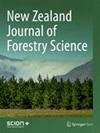发芽前处理对山楂种子萌发及幼苗生长的影响
IF 1.1
4区 农林科学
Q2 FORESTRY
引用次数: 7
摘要
背景:绿叶Nothofagus glauca(Phil.)Krasser是智利地中海地区的一种特有树木。由于农业作物和快速生长的树种的更替等人为原因,该地区的天然林已经严重支离破碎。从1975年起,这些森林从900000公顷减少到145000公顷,因此在国际自然保护联盟红色名录中被归类为“易危”。在恢复这一生态系统的过程中,应在一定程度上侧重于优质种群的繁殖。然而,关于传播系统的信息仍然不足。方法:分析不同发芽前处理和播种时间对种子发芽、幼苗生长和质量的影响。发芽前处理为:(i)冷分层;(ii)浸泡在赤霉酸(GA3)和硫脲溶液中;(iii)苗圃栽培,播种时间为7月、8月和9月。结果:将种子浸泡在GA3溶液中,无论浓度如何,都能获得较高的发芽率;分层,不分时期;或浸泡在7.5mg L-1硫脲溶液中的值与对照处理的值显著不同。播种时间与发芽率或幼苗发育率无关。在5°C下分层60天产生了白眼N.glauca幼苗的最佳质量指数,但在发芽前处理的任何形态属性测试中都没有发现显著差异。结论:发芽前处理显著提高了白果的发芽率和幼苗生长。建议在5°C下进行60天的冷分层,因为它能产生适合田间种植的幼苗。赤霉素和硫脲对幼苗生长没有显著影响。我们的研究结果表明,白果种子存在内源性生理休眠。这项研究的结果提供了关于蓝N.glauca繁殖和育苗技术的重要信息,可用于恢复计划。本文章由计算机程序翻译,如有差异,请以英文原文为准。
Effect of pre-germinative treatments on Nothofagus glauca seed germination and seedling growth
Background: Nothofagus glauca (Phil.) Krasser (Nothofagaceae, “Hualo”) is an endemic tree of the Mediterranean zone of Chile. The natural forests in this area have been severely fragmented as a result of human causes such as replacement by agricultural crops and fast-growing tree species. From 1975, these forests have declined from 900,000 ha to 145,000 ha, so it is categorised on the IUCN Red List as ‘vulnerable’. In restoring this ecosystem, efforts should focus, in part, on the propagation of quality stock. However, information on propagation systems is still insufficient.
Methods: We aimed to analyse the effect of different pre-germinative treatments and sowing times on seed germination, and seedling growth and quality. The pre-germinative treatments were: (i) cold stratification; (ii) soaking in gibberellic acid (GA3) and thiourea solution; and (iii) nursery cultivation, while the sowing times were July, August and September.
Results: A high germination capacity was achieved by: soaking the seeds in GA3 solution irrespective of concentration; stratifying, irrespective of period; or soaking in 7.5 mg L-1 thiourea solution, values significantly varied from that of the control treatments. The sowing time was not relevant in terms of the percentage of germination or seedling development. Stratification at 5°C for 60 days produced the best quality indices for N. glauca seedlings but no significant differences were found in any of the morphological attributes tested as a result of the pre-germinative treatments.
Conclusions: The pre-germinative treatments significantly improved the germination and seedlings growth of N. glauca. Cold stratification at 5°C for 60 days is recommended as it produced suitable seedlings for field establishment. Gibberellic acid and thiourea did not produce important effects on seedling growth. Our results suggest the presence of endogenous physiological dormancy of the N. glauca seeds. The results of this study provide important information on propagation and nursery techniques of N. glauca, which can be used in restoration programmes.
求助全文
通过发布文献求助,成功后即可免费获取论文全文。
去求助
来源期刊

New Zealand Journal of Forestry Science
FORESTRY-
CiteScore
2.20
自引率
13.30%
发文量
20
审稿时长
39 weeks
期刊介绍:
The New Zealand Journal of Forestry Science is an international journal covering the breadth of forestry science. Planted forests are a particular focus but manuscripts on a wide range of forestry topics will also be considered. The journal''s scope covers forestry species, which are those capable of reaching at least five metres in height at maturity in the place they are located, but not grown or managed primarily for fruit or nut production.
 求助内容:
求助内容: 应助结果提醒方式:
应助结果提醒方式:


